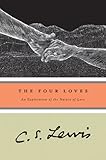
The Four Loves
Product Description
"We need others physically, emotionally, intellectually; we need them if we are to know anything, even ourselves."
We hear often that love is patient and kind, not envious or prideful. We hear that human love is a reflection of divine love. We hear that God is love. But how do we understand its work in our lives, its perils and rewards? Here, the incomparable C. S. Lewis examines human love in four forms: affection, the most basic, general, and emotive; friendship, the most rare, least jealous, and, in being freely chosen, perhaps the most profound; Eros, passionate love that can run counter to happiness and poses real danger; charity, the greatest, most spiritual, and least selfish. Proper love is a risk, but to bar oneself from it--to deny love--is a damning choice. Love is a need and a gift; love brings joy and laughter. We must seek to be awakened and so to find an Appreciative love through which "all things are possible."
"The Four Loves deserves to become a minor classic as a modern mirror of our souls, a mirror of the virtues and failings of human loving." New York Times Book Review
"Lewis has a keen eye, a large measure of human sympathy, wit, and a command of simple words." Times Literary Supplement
C. S. (Clive Staples) Lewis (1898-1963), one of the great writers of the twentieth century, also continues to be one of our most influential Christian thinkers. He wrote more than thirty books, both popular and scholarly, including The Chronicles of Narnia series, The Screwtape Letters, The Four Loves, Mere Christianity, and Surprised by Joy.
Amazon.com Review
The Four Loves summarizes four kinds of human love--affection, friendship, erotic love, and the love of God. Masterful without being magisterial, this book's wise, gentle, candid reflections on the virtues and dangers of love draw on sources from Jane Austen to St. Augustine. The chapter on charity (love of God) may be the best thing Lewis ever wrote about Christianity. Consider his reflection on Augustine's teaching that one must love only God, because only God is eternal, and all earthly love will someday pass away:
Who could conceivably begin to love God on such a prudential ground--because the security (so to speak) is better? Who could even include it among the grounds for loving? Would you choose a wife or a Friend--if it comes to that, would you choose a dog--in this spirit? One must be outside the world of love, of all loves, before one thus calculates.His description of Christianity here is no less forceful and opinionated than in Mere Christianity or The Problem of Pain, but it is far less anxious about its reader's response--and therefore more persuasive than any of his apologetics. When he begins to describe the nature of faith, Lewis writes: "Take it as one man's reverie, almost one man's myth. If anything in it is useful to you, use it; if anything is not, never give it a second thought." --Michael Joseph Gross
